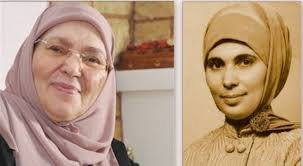This Turkish Hijab activist was sued, charged and imprisoned but it didn’t stop her. Sule Yuksel Senler was born in 1938 and grew up in Istanbul. Despite having to drop out of school in the 8th Grade, she went on to become a successful writer, journalist and Hijab activist. But for many years she was not interested in Hijab. She grew up in a Turkey that pushed secularism, where women had to choose between Hijab or official schooling and professional careers.
Mustafa Kamal Ataturk, a tyrant ruler, had created a new nation. A modern Western alphabet replaced the old Arabic script. Western dress was adopted and polygamy was made unlawful and coming up with all types of laws and policies to take people away from their religion, Islam. Her family adopted a secular lifestyle except for her brother, Ozer, who was a follower of Said Nursi, a Muslim theologian who played a vital role in the revival of Islam in Turkey.
In her 20s, she started to attend the meeting of Nursi’s followers, but still had no interest in Hijab. When asked about her clothing at meetings, she would say, “If you don’t accept me like this, I won’t come again.” But in 1965, aged 27, Senler began to pray and started wearing the veal.
She went on to become the first veiled journalist in Turkey, who used her platform to write about Muslim women and the Hijab. In 1967 the Turkish Women’s Union filed a lawsuit against her for an article in which she wrote, “It’s a must that Muslim women put on their headscarves.” During the 60s and 70s she travelled around Turkey, giving lectures and many of her followers began to wear the headscarf, but her actions didn’t go unnoticed by the power of the time.
One conference in Ankara’s Faculty of Language, History and Geography, in 1971, caught the attention of then President Cevdet Sunay, who said, “Those behind (the increasing number of) covered women on the streets will be punished.” Senler responded in a letter to Sunay, saying that he “should apologise to Allah and the nation.”
A warrant was put out for her arrest, and when she was hospitalised, the police were called, but doctors helped her escape. She lived on the run, until she was taken ill again with tuberculosis. Not unable to run, she handed herself to the police and was thrown into Bursa jail for a 9-month sentence. After public outcry Sunay pardoned her two months into her sentence, but she refused amnesty and carried out her whole sentence, despite her ill health.
After her release she defiantly continued to give lectures and write articles and books for many years. At age 81, Senler passed away in hospital on the 28th of August 2019. May Allah accept her struggle in the way of Islam and grant her Jannatul Firdaus.
Today, many women are taking the Hijab forward and are speaking boldly about it. When Tawakkol Karman, the First Arab Woman and Youngest Nobel Peace Laureate, was asked about her Hijab by journalists and how it is not proportionate with her level of intellect and education, she replied, “Man in the early times was almost naked, and as his intellect evolved he started wearing clothes. What I am today and what I’m wearing represents the highest level of thought and civilization that man has achieved, and is not regressive. It’s the removal of clothes again that is regressive back to ancient times.”
The status of women in Islam is often the target of attacks in the secular media. The ‘hijab’ or the Islamic dress is cited by many as an example of the ‘subjugation’ of women under Islamic law. In this context the ‘World Hijab Day’ is celebrated. It is an annual event founded by Nazma Khan in 2013. The event takes place on February 1st each year in 140 countries worldwide. Its stated purpose is to encourage women of all religions and backgrounds to wear and experience the hijab. Event organisers describe it as an opportunity for non-Muslim women to experience the hijab.
Hijab is not a fashion; it is a commandment by our Creator, as he knows what is good and what is bad for people and the society. Allah says, “And tell the believing women to reduce (some) of their vision and guard their private parts and not expose their adornment except that which (necessarily) appears thereof and to wrap (a portion of) their head covers over their chests and not expose their adornment except to their husbands, their fathers, their husbands’ fathers, their sons, their husbands’ sons, their brothers, their brothers’ sons, their sisters’ sons, their women, that which their right hands possess, or those male attendants having no physical desire, or children who are not yet aware of the private aspects of women. And let them not stamp their feet to make known what they conceal of their adornment. And turn to Allah in repentance, all of you, O believers, that you might succeed.” (Qur’an 24:31)
Hijab is not just a piece of cloth around our body but it is something much more. However, Muslim women across the world have started taking Hijab more seriously, but still a lot needs to be done so that all Muslim women start wearing Hijab in its true sense and spirit and by understanding its real objective.
The life of Sule Yuksel Senler should be an inspiration to every Muslim, especially young girls, so that they can do something similar, to contribute significantly in the way of Islam. Who will be the next Sule Yuksel Senler, who will strive towards establishing the principles of Islam on the face of this earth and contributing positively a peaceful society?


